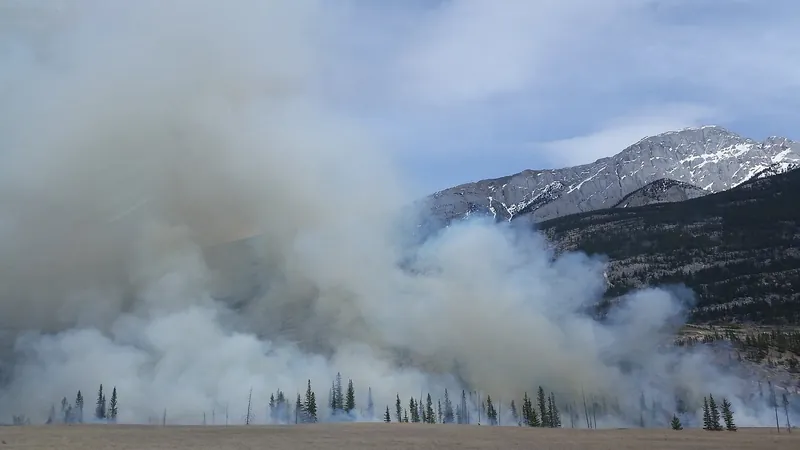
Shocking Discovery: Wildfire Smoke Linked to Increased Mental Health Crisis!
2025-04-04
Author: Mei
Introduction
A startling new study from Harvard T.H. Chan School of Public Health reveals that exposure to fine particulate air pollution (PM2.5) from wildfire smoke is associated with a surge in emergency department visits for mental health issues. This comprehensive research is crucial as it uncovers the previously underestimated toll of wildfire smoke—not just on breathing, but on our mental well-being as well.
Key Findings
Lead author Kari Nadeau, a prominent figure in climate and population studies, states, 'Wildfire smoke isn't just a respiratory issue—it affects mental health, too.' This groundbreaking study emphasizes that beyond the immediate trauma of wildfires, smoke itself could be directly worsening mental health conditions such as depression and anxiety.
Study Details
Published in JAMA Network Open, this study stands out as it is the first to pinpoint the short-term impacts of PM2.5 specifically tied to wildfires. While there's been an accumulation of research linking PM2.5 to mental health outcomes, most prior studies honed in on its implications for respiratory and cardiovascular health, leaving a significant gap regarding its psychological effects.
Data Analysis
Researchers analyzed comprehensive data on wildfire-specific PM2.5 levels and mental health-related emergency department visits across California during the catastrophic wildfire season of mid-2020. The study covered the intense period between July and December, during which California faced the worst wildfire devastation on record.
Emergency Visits Statistics
The data revealed a staggering 86,588 mental health-related visits to emergency departments throughout this timeframe. The daily concentration of wildfire-specific PM2.5 averaged 6.95 micrograms per cubic meter, spiking to 11.9 during peak wildfire activity and peaking at a distressing 24.9 micrograms in September.
Correlation with Mental Health Issues
Crucially, the findings indicate that even a 10 micrograms per cubic meter increase in wildfire-specific PM2.5 correlates with a significant rise in mental health emergency visits—particularly for conditions like depression and anxiety—lasting up to a week post-exposure.
Vulnerable Populations
Particularly vulnerable populations emerged from the study, including women, children, young adults, and minorities such as Black and Hispanic individuals. Medicaid recipients also faced higher risks of requiring mental health services after exposure to wildfire smoke. 'The disparities in impact by race, sex, age, and insurance status suggest that existing health inequities may be exacerbated by wildfire smoke exposure,' co-author YounSoo Jung commented.
Conclusion and Urgency for Action
As wildfires grow more frequent and intense due to climate change, this study underlines the urgent need for public health interventions and increased awareness of the widespread effects of air pollution on mental health. It's not just about protecting our lungs; we also need to safeguard our minds! Stay alert; the smoke may be clouding more than just the skies.

 Brasil (PT)
Brasil (PT)
 Canada (EN)
Canada (EN)
 Chile (ES)
Chile (ES)
 Česko (CS)
Česko (CS)
 대한민국 (KO)
대한민국 (KO)
 España (ES)
España (ES)
 France (FR)
France (FR)
 Hong Kong (EN)
Hong Kong (EN)
 Italia (IT)
Italia (IT)
 日本 (JA)
日本 (JA)
 Magyarország (HU)
Magyarország (HU)
 Norge (NO)
Norge (NO)
 Polska (PL)
Polska (PL)
 Schweiz (DE)
Schweiz (DE)
 Singapore (EN)
Singapore (EN)
 Sverige (SV)
Sverige (SV)
 Suomi (FI)
Suomi (FI)
 Türkiye (TR)
Türkiye (TR)
 الإمارات العربية المتحدة (AR)
الإمارات العربية المتحدة (AR)